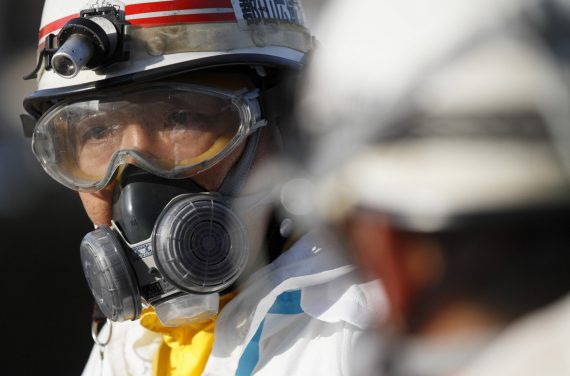Japan Nuclear Crisis Reaches Chernobyl Level
The Japan nuclear meltdown has now topped the scale used to measure such things, reaching the same level as the Chernobyl disaster. It's a stupid scale.
The Japan nuclear meltdown has now topped the scale used to measure such things, reaching the same level as the Chernobyl disaster.
AP (“Japan ups nuke crisis severity to match Chernobyl“):
Japan raised the crisis level at its crippled nuclear plant Tuesday to a severity on par with the 1986 Chernobyl disaster, citing high overall radiation leaks that have contaminated the air, tap water, vegetables and seawater.
Japanese nuclear regulators said they raised the rating from 5 to 7 — the highest level on an international scale of nuclear accidents overseen by the International Atomic Energy Agency — after new assessments of radiation leaks from the Fukushima Dai-ichi plant since it was disabled by the March 11 tsunami.
The new ranking signifies a “major accident” that includes widespread effects on the environment and health, according to the Vienna-based IAEA. But Japanese officials played down any health effects and stressed that the harm caused by Chernobyl still far outweighs that caused by the Fukushima plant.
[…]
But Edano told reporters there was no “direct health damage” so far from the crisis. “The accident itself is really serious, but we have set our priority so as not to cause health damage.”
Hironobu Unesaki, a nuclear physicist at Kyoto University Research Reactor Institute, said the revision was not a cause for worry, that it had to do with the overall release of radiation and was not directly linked to health dangers. He said most of the radiation was released early in the crisis and that the reactors still have mostly intact containment vessels surrounding their nuclear cores.
The change was “not directly connected to the environmental and health effects,” Unesaki said. “Judging from all the measurement data, it is quite under control. It doesn’t mean that a significant amount of release is now continuing.”
I’m a political scientist, not a nuclear scientist, so my expertise on such things is limited. The 7 point rating scale in use here may make absolute sense from a standpoint of understanding the structural damage involved and therefore very useful in the expert community.
But it’s abundantly clear that it’s not useful–it’s in fact harmful–as a tool for communicating the level of a nuclear crisis to the public. To simultaneously declare this a “Chernobyl level meltdown” while trying to persuade people that this is nothing at all like Chernobyl in terms of danger to the public–the only thing the public cares about–is confusing and adds to the level of fear.
s

Health risk is very complicated, dependent on the quantities of each type of isotope released and to where.
In related news, a recent dolphin die-off in the gulf was tied to last year’s oil spill.
Follow-on effects can be stubborn.
While I don’t pretend to understand the science, I fully get that it’s incredibly complicated for experts to measure follow-on effects with any precision early in a crisis. And that’s fine. I just think the public use of scales designed for a discrete purpose is a bad idea.
Give the people the best guess as to what the health effects are. But don’t tell them it’s Chernobyl-like when the best guess is that it’s nothing like Chernobyl except in a way they don’t care about.
Well, I doubt there is a best guess. We’d need an accurate chart of releases, types, destinations, and then review by medical experts.
I believe the information on radiation releases at Fukushima have been spotty, and slow.
French researchers are advising women and children on an iodine risk. Kind of disturbing for those of us 6,000 miles closer to Fukushima.
http://www.euractiv.com/en/health/radiation-risks-fukushima-longer-negligible-news-503947
This is playing out remarkably similarly to the H1N1 flu virus debacle. The technical experts think they’ve come up with a system that they can use publicly, but then that system creates more confusion than it clears.
Chernobyl was so much worse on so many levels. A graphite fire in the reactor core with no containment structure will be rather “tough” for Fukushima to beat..